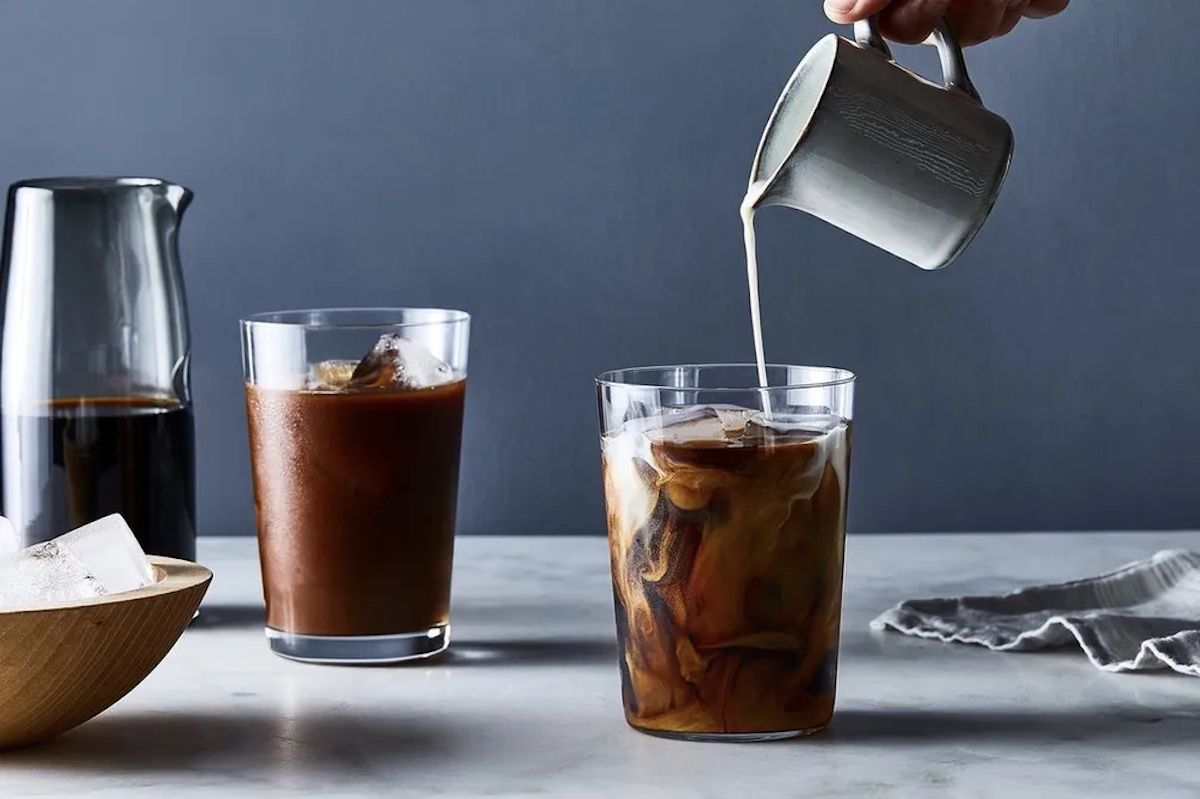Recently, Twitter users turned against oat milk (proving that you really never know who will be canceled next!). Citing an almost year-old deep-dive specifically calling out the popular brand Oatly, this article calls oat milk the "new Coke," stating the company masquerades as a so-called healthy alternative to dairy (and other nondairy) milks, but is essentially sugar water cut with oil, and a "bad" choice when it comes to creamy beverages.
The article compares Oatly's marketing strategy — its splashiest slogan being "it's like milk but made for humans" — to Sugar Association ads from the 1970s ("only 18 calories per teaspoon, and it's all energy"); 1930s cigarette brands ("give your throat a break"); and Coca-Cola's 2009 "open happiness" campaign, the article launches into a very spooky breakdown of the science behind the oat milk. Essentially, during Oatly's oat-liquefaction process, enzymes convert oat starch to a high-glycemic-index-ranking sugar, and rapeseed, or canola, oil is used as an emulsifier. The result is Oatly's particularly velvety texture and non-watery flavor, both of which I personally count as wins when it comes to nondairy milk.
This article (and many, many people on Twitter) apparently do not. Several hundred words later, the article comes to this conclusion: "Is Oatly designed for human consumption? Definitely. Is it healthy? Definitely not."
Setting aside that fact that a splash of oat milk is coffee is quite different than downing a 20-ounce bottle of soda, why, I ask, in the Year of Our Lord 2021, are we still obsessed with labeling every stupid thing we put into our bodies as "healthy" or "unhealthy"? Considering there are so many foods we can get nutrients from, why do we continue to blame snacks and beverages for not being pure sources of nutritional density? And also, well, what the hell am I supposed to put in my coffee?
I won't give you my whole spiel on how dangerous it is to prescribe virtue or vice to ingredients. (I will say it ruined my relationship with my body and with eating for about a decade.) And it's certainly not great when a brand tries to influence people into buying their product by citing health claims, whether proven or inflated — though it should be noted that Oatly is far from the first nondairy, dairy, or general food brand to do this. Pair that with the environmental and labor implications made when purchasing one type or brand of milk, and it would appear that when it comes to making my morning cup of caffeine creamy, there are simply no options.
* * *
The Milks Aren't Alright
Allow me to break down all the reasons literally no milk, from a cow or otherwise, is a perfect option.
Dairy Milk (and Half-And-Half and Cream)
Milk from cows is high in saturated fat (and that is "bad")! Our tummies can't digest lactose as we get older. And it may not even be that helpful when it comes to bone health after childhood.
Soy Milk
Soy milk is often sweetened, and sugar is "bad!" (And of course when it's unsweetened, let's be real, it doesn't taste fantastic.) Plus, soy contains compounds that mimic estrogen, which could cause health complications.
Almond Milk
The most common emulsifier used in almond milk can irritate our gut! It's also kind of . . . watery? Which is fine for a smoothie, but if I wanted watery coffee I'd just add, well, water.
Coconut Milk
Coconut milk is very high in saturated fat! (And that's "bad", remember?) It tastes best from the can (as opposed to the watered-down, stabilized versions from a carton), but gets weirdly separated when poured into a cup of hot coffee. And, oh yeah, some of those cans contain BPA, which can lead to hosts of physical complications.
Pea Milk
It's high in protein, mostly hypoallergenic, fortified with plenty of nutrients, and creamy — but I'm just going to speak my truth: Many brands of pea milk taste like their star ingredient, with a slightly chalky aftertaste. It's easy enough to hide in a smoothie, but in coffee? I just can't.
Other Nut Milks
Fancy nuts like cashews, pecans, macadamias, hazelnuts, and pistachios all make pretty excellent-tasting nondairy milks. Elmhurst Milked Cashews, Walnuts, and Hazelnuts are simply the nut and water, making for a low-risk, creamy add to a cup of coffee; and Táche, which foams gloriously even with an at-home frother, is the only purely pistachio nut milk on the market (others are cut with additional nuts or seeds), but these milks tend to come with a significantly higher price tag than the rest, and in a smaller carton to boot — nuts are expensive to produce and harvest, there's no way around it.
And Wait, There's The Environmental Stuff, Too
While oat milk is actually quite low on the emissions, water, and land-use scale, if the oats used were treated with unsafe levels of pesticides, we have a new can of worms to open. Unsustainable farming practices from dairy to almond to soybean farmers contribute to skyrocketing methane emissions. Producers overuse water in drought-prone areas, contribute to deforestation, and deprioritize biodiversity as product demand grows. Unethical labor practices, both human and animal, continue to crop up the more these industries are looked into. Whew.
After I poured this morning's coffee, I first decided I would drink it black, even though I had oat and almond milk, as well as cream in the fridge. Wow, do I hate black coffee. I added some oat milk. (To quote Demi, sorry, not sorry.) Then I ate breakfast, crunching on the fat flakes of sea salt I put on my eggs every day. I clicked back onto Twitter to discover people freaking out about a new study, which found that salt is apparently screwing with our immune systems. Ugh.




Shares